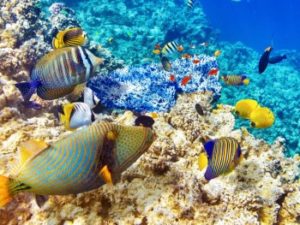by C. Idso, March10, 2020 in ClimateChangeDispatch
Paper Reviewed: Clark, T.D., Raby, G.D., Roche, D.G., Binning, S.A., Speers-Roesch, B., Jutfelt, F. and Sundin, J. 2020. Ocean acidification does not impair the behavior of coral reef fishes. Nature 577: 370-375.
In an incredibly important and revealing paper published in the journal Nature, Clark et al. (2020) write that “establishing a robust and independently replicated database of the effects of ocean acidification on fishes is essential to gain a reliable understanding of the consequences of climate change on marine ecosystems.”
Such a database, they add, is critical “before drawing broad conclusions and implementing management measures.”
Unfortunately, too many have been far too eager to jump to conclusions when it comes to estimating the impacts of ocean acidification.
And in this regard, Clark et al. note that “a number of highly publicized studies have reported detrimental effects of elevated CO2 levels on the sensory systems and behaviors of fishes, with coral reef fishes appearing to be the most sensitive despite experiencing large daily and seasonal fluctuations in nature (for example, 100-1,300 µatm).”
Such projected detrimental effects include “alterations in olfaction, hearing, vision, learning, behavioral lateralization, activity levels, boldness, anxiety, and susceptibility to predation,” which have led to “dire predictions for fish populations and marine ecosystems.”
But how solid is this body of research?
Clark et al. note there are two important red flags that call the pessimistic ocean acidification projections of fish into question.
…

